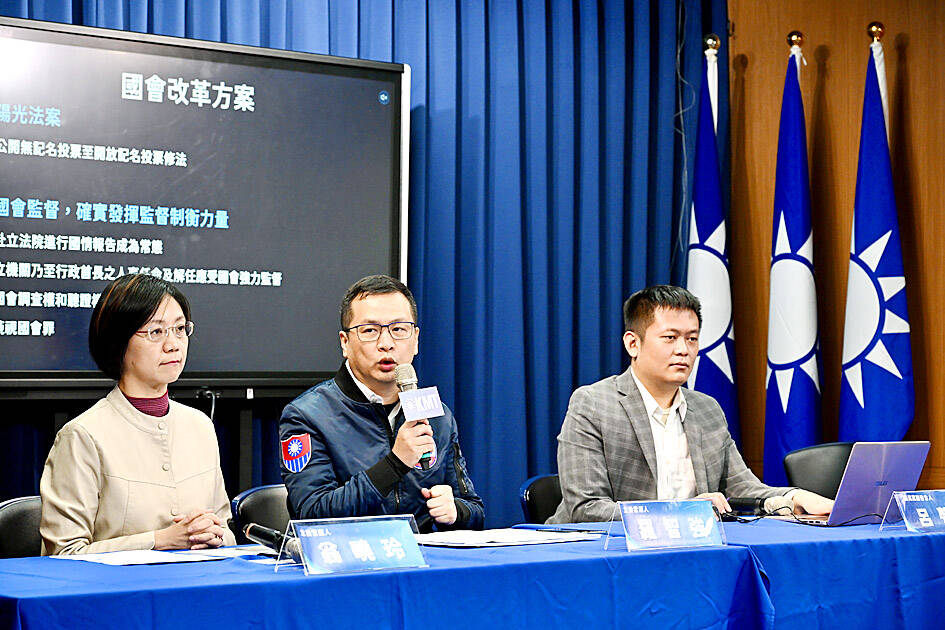Chinese Nationalist Party (KMT) legislators yesterday said they would introduce bills to increase legislative transparency and oversight of the government, while also opening the vote for speaker when the new legislature starts on Thursday next week.
The proposed measures seek to make the legislative speaker and deputy speaker election an open ballot vote, normalize presidential reports to the legislature, give the legislature oversight of personnel appointments to independent or critical governmental organizations, and enforce the legislature’s powers of inquiry.
KMT legislator-elect Lo Chih-chiang (羅智強) said that the Democratic Progressive Party (DPP) raised similar ideas in 2016, but did not implement them after gaining a majority.

Photo: Lo Pei-de, Taipei Times
“The KMT is picking up where the DPP left off,” he said.
As elections for speakers at the county and city council level are open, the Legislative Yuan should follow suit, KMT legislator-elect Weng Hsiao-ling (翁曉玲) said.
She said there was precedent in holding open ballots at the legislature, and the Supreme Court in 2015 ruled that making known who the legislator voted for to be speaker does not contravene Article 132 of the Criminal Code.
She also called for amendments to the Act on Exercising Legislative Yuan Powers (立法院職權行使法) and the Regulations on Electing the Legislative Speaker and Deputy Speaker by Legislators (立法委員互選院長副院長辦法) to reflect that an open ballot is legal.
Citing amendments to the Constitution stating that the Legislative Yuan can have the president conduct a “state of the union” address, Weng said that the phrasing should be changed from “can” to “should.”
The legislature only holds the powers to ratify appointments of those who would head independent organizations, but it should also ratify the appointments of personnel to head other critical government posts, she said, adding that the legislature should also be allowed to dismiss ministers.
Additionally, as the legislature can only obtain documents about specific individuals and cannot make inquiries, those shortcomings should be addressed in the Act on Exercising Legislative Yuan Powers, she said.
DPP caucus whip Ker Chien-ming (柯建銘) said that the DPP respects the proposals of other parties and would present its own versions.
Ker said “it is all the same” to him who among the KMT takes what position, as the DPP would have to accept them, adding that he “is confident on being able to handle legislative affairs with his 30 years in the legislature.”
Additional reporting by Hsieh Chun-lin

CAUTION: Based on intelligence from the nation’s security agencies, MOFA has cautioned Taiwanese travelers about heightened safety risks in China-friendly countries The Ministry of Foreign Affairs (MOFA) yesterday urged Taiwanese to be aware of their safety when traveling abroad, especially in countries that are friendly to China. China in June last year issued 22 guidelines that allow its courts to try in absentia and sentence to death so-called “diehard” Taiwanese independence activists, even though Chinese courts have no jurisdiction in Taiwan. Late last month, a senior Chinese official gave closed-door instructions to state security units to implement the guidelines in countries friendly to China, a government memo and a senior Taiwan security official said, based on information gathered by Taiwan’s intelligence agency. The

The National Immigration Agency (NIA) said yesterday that it will revoke the dependent-based residence permit of a Chinese social media influencer who reportedly “openly advocated for [China’s] unification through military force” with Taiwan. The Chinese national, identified by her surname Liu (劉), will have her residence permit revoked in accordance with Article 14 of the “Measures for the permission of family- based residence, long-term residence and settlement of people from the Mainland Area in the Taiwan Area,” the NIA said in a news release. The agency explained it received reports that Liu made “unifying Taiwan through military force” statements on her online

Taiwan Semiconductor Manufacturing Co (TSMC), the world’s largest contract chipmaker, said yesterday that it is looking to hire 8,000 people this year, at a time when the tech giant is expanding production capacity to maintain its lead over competitors. To attract talent, TSMC would launch a large-scale recruitment campaign on campuses across Taiwan, where a newly recruited engineer with a master’s degree could expect to receive an average salary of NT$2.2 million (US$60,912), which is much higher than the 2023 national average of NT$709,000 for those in the same category, according to government statistics. TSMC, which accounted for more than 60 percent

Tung Tzu-hsien (童子賢), a Taiwanese businessman and deputy convener of the nation’s National Climate Change Committee, said yesterday that “electrical power is national power” and nuclear energy is “very important to Taiwan.” Tung made the remarks, suggesting that his views do not align with the country’s current official policy of phasing out nuclear energy, at a forum organized by the Taiwan People’s Party titled “Challenges and Prospects of Taiwan’s AI Industry and Energy Policy.” “Taiwan is currently pursuing industries with high added- value and is developing vigorously, and this all requires electricity,” said the chairman